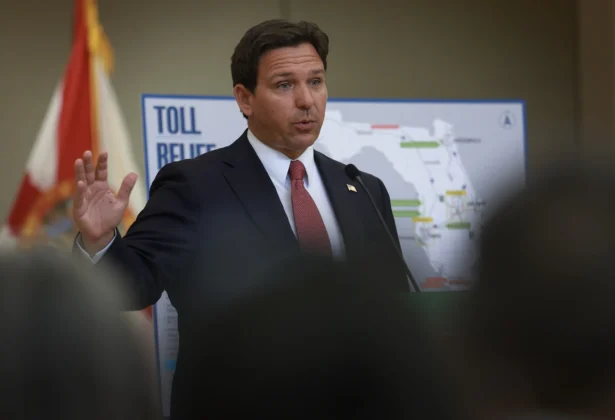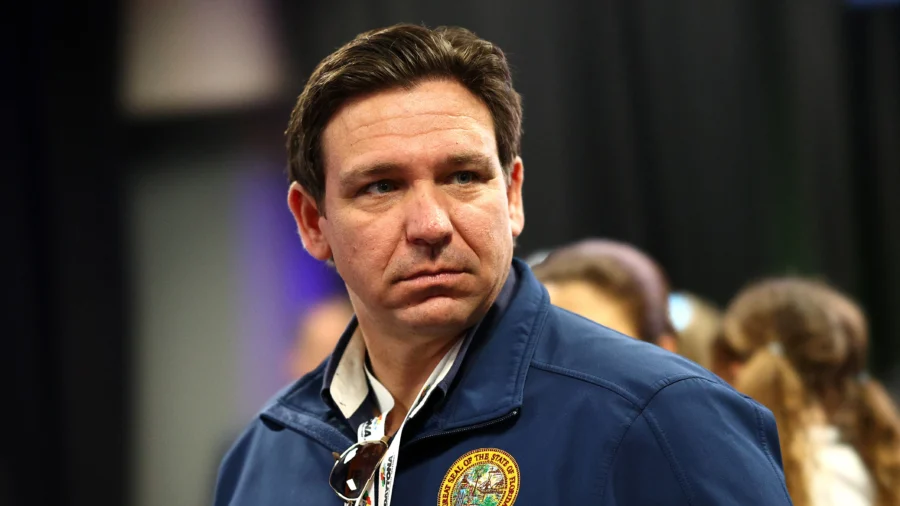A Florida appeals court on June 12 declined to offer an opinion on arguments made by lawyers for Gov. Ron DeSantis that his administration can shield certain records from the public due to executive privilege.
The unanimous ruling by Florida’s First District Court of Appeal relates to a lower court decision last year.
“After denying the petition for procedural reasons, the [lower] court unnecessarily considered the merits of the petition and ruled the identities of the legal conservative heavyweights are protected by executive privilege,” First District Court of Appeal Judge L. Clayton Roberts wrote for the panel, in reference to the earlier decision.
“We expressly decline to rule on the propriety of this ruling as it was irrelevant and unnecessary,” Judge Roberts wrote.
The appeal stemmed from a public records request filed by an individual—identified in court documents only as J. Doe—with the governor’s office in October 2022.
Court documents state that the individual requested an array of “materials” and communications including call logs, emails, or texts, between or among the governor and his wife Casey DeSantis, his chief of staff, his executive or personal assistants or aides, his general counsel or anyone within the general counsel’s office.
According to court documents, similar information was also requested from the director of appointments or anyone within the director of the appointment’s office, and from “the ‘six or seven pretty big legal conservative heavyweights’ described by the governor in an interview with Hugh Hewitt on August 25, 2002 [sic].”
DeSantis Discusses ‘Big Legal Conservative Heavyweights’
In the interview referenced in the court documents, Mr. DeSantis told conservative commentator Hugh Hewitt that he convenes a group of people whom he trusts when it comes to picking judicial appointments for the Florida Supreme Court.
Specifically, Mr. DeSantis told the show’s host that the group of people “put these candidates through the wringer.”
“So they will go into a room and you’ll have six or seven pretty big legal conservative heavyweights, and they have to answer questions,” the governor said. “I’m not there for that, but then I get debriefed by them, and then I’ll sit and do interviews with each individual candidate.”
According to the lawsuit, after listening to the interview, Mr. Doe subsequently requested that the governor’s office hand over the records identifying the individuals who aided him in screening candidates for appointment to the state’s highest court.
Initially, the governor’s office acknowledged that the request was in a queue along with a “high volume of other requests.” However, over the next 20 days, Mr. Doe attempted to expedite his request. He later informed the governor’s office that he intended to file a lawsuit over the matter and suggested that they provide the names of the so-called “heavyweights” to resolve the request, according to court documents.
The individual subsequently filed a lawsuit over the records, prompting lawyers for Mr. DeSantis and Attorney General Ashley Moody to argue that the governor’s office has the constitutional authority to shield records regarding internal deliberations or discussions.
In court filings late last year, lawyers for the state said that “maintaining the confidentiality of deliberations concerning judicial appointments is necessary to enable the Governor and his aides to receive candid, unfiltered advice regarding the exercise of an important constitutional function.”

‘Exceptional circumstances’
They further argued that Mr. Doe had failed to show any need for the information he requested from the governor’s office that would “overcome this privilege.”
Countering those arguments, lawyers for Mr. Doe noted that there is no law establishing executive privilege for the governor in Florida’s Constitution.
They further pointed to a 1992 public records amendment that added the Public Records Clause in Article I, Section 24 to the Florida Constitution as part of efforts to provide public access to government records.
However, Leon County Circuit Court Judge Angela Dempsey ultimately tossed the lawsuit out in January 2023, ruling, in part, that the DeSantis administration did have executive privilege to shield certain records from the public.
In its ruling on June 12, the appeals court said the lawsuit should not have been allowed to move forward because “while anonymous filings are not prohibited in Florida, they should be reserved for those exceptional circumstances that outweigh the public interest in open proceedings.”
The panel of judges also found that Mr. Doe had failed to demonstrate a “clear legal right” to have the governor’s office fulfill his request as it was submitted, including by broadly requesting records between “many people during an unspecified period of time.”
“While the records custodian could possibly intuit some contextual parameters, the core information Appellant sought was a list of names Governor DeSantis referenced in a particular interview,” the appeals court wrote. “Fulfilling such a request would require the records custodian to consult with the Governor to determine exactly who he was referencing in this interview.”
From The Epoch Times

